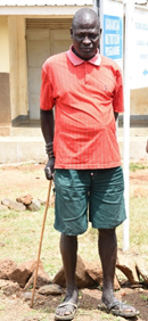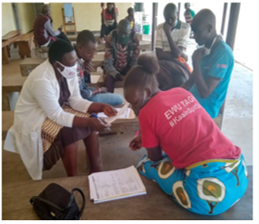- What We Do
- Agriculture and Food Security
- Democracy, Human Rights and Governance
- Economic Growth and Trade
- Education
- Environment and Global Climate Change
- Gender Equality and Women's Empowerment
- Global Health
- Humanitarian Assistance
- Transformation at USAID
- Water and Sanitation
- Working in Crises and Conflict
- U.S. Global Development Lab
Speeches Shim

In 2019, Uganda’s Ministry of Health declared the Karamoja region, with an estimated population of 1.2 million, to have one of the highest TB burdens in Uganda. Within the region, the Ministry of Health approximated that five of every 10 TB patients complete treatment successfully, and only three in 10 are cured.
In January 2020, the Programme for Accelerated Control of Tuberculosis (PACT) Karamoja project, implemented by USAID local partner the Infectious Diseases Institute, was launched to close this gap and assist in getting services closer to the people most in need of them. Through the project, people without formal medical training, known as community owned resource persons, are able to help identify TB patients in the communities, collect sputum samples for testing, and assist in linking TB patients who have stopped taking their medication back to care.
“Many people here think having TB automatically means you have AIDS,” says Joseph Aburah, a community owned resource person trained through the project. “This is a myth we are working hard to dispel, and it helps that I have the health center staff to teach me these things so that I can help my brothers and sisters.”
One of the people helped by the project is Lokoru Lepatabo, the watchman at Tapac Health Centre III. Lokoru comes to work every day and sits under a tree a few meters away from the wired fence and gate that leads to the in-patient wards. Lokoru is just over six feet with a robust physique, uncharacteristic of his sixty years. He was able to work during the last stages of treatment for TB.

Tapac Health Centre III serves a resource-poor community in Karamoja that is dominated by the Tepeth, a tribe where many work in strenuous marble mining. With barely any means of transportation, the people in the communities surrounding Tapac walk tens of kilometers to get to health centers and to access basic services.
Lokoru’s illness was discovered after his three children were identified and tested positive for TB during a door-to-door testing exercise by PACT-trained village health teams. After his entire family was tested, he was found to be the only other family member with a TB diagnosis. His children have since recovered.
“I looked terrible in the beginning,” Lokoru said. “I had lost a lot of weight and was extremely weak. I had trouble coming to work and thought maybe it was just old age. Even the medication initially made me weak, but I would not be here if I had not persisted.”
With support from community owned resource persons, Lokoru completed his treatment in August.

Comment
Make a general inquiry or suggest an improvement.